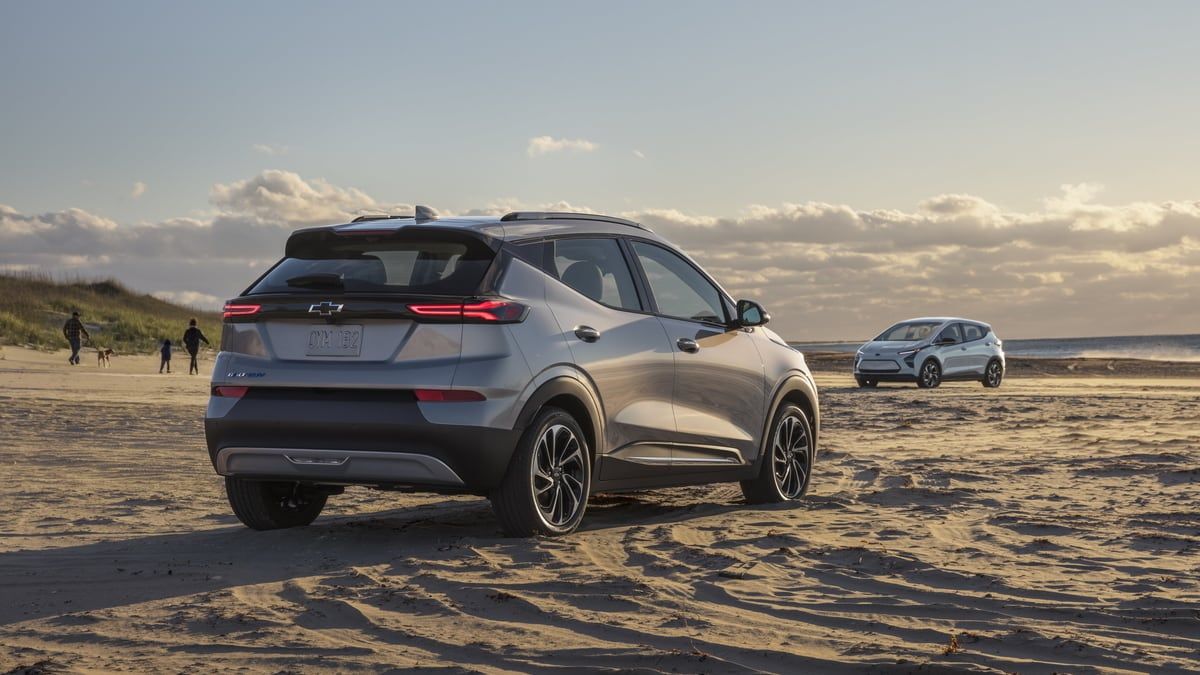General Motors is absolutely doing the right thing by recalling every Chevrolet Bolt it has produced because of concerns about battery fires. Earlier, Chevrolet recalled most of the 2017-2019 Bolt EVs, because of concerns about fires. Now, the recall covers 141,685 vehicles, including the all-new 2022 Bolt EUV. GM and Chevrolet can’t afford to have concerns about fires derail its plans for an electric future, especially seeing as it is already planning to switch to a different type of battery.
“Our focus on safety and doing the right thing for our customers guides every decision we make at GM,” said Doug Parks, GM executive vice president, Global Product Development, Purchasing and Supply Chain. “As leaders in the transition to an all-electric future, we know that building and maintaining trust is critical. GM customers can be confident in our commitment to taking the steps to ensure the safety of these vehicles.”
Battery Production Problem
Chevrolet and General Motors are making it very clear that it is a supplier manufacturing defect causing the recall and that it will pursue reimbursement from the supplier, LG, for the recall, which is now expected to cost a reported $1.8 billion. While GM has confirmed 10 fires, an investigation has found the defect that causes the fire in some of the new batteries, so they have decided to issue the total recall. No deaths have been reported but there have been smoke inhalation injuries. There has also been fire and smoke damage to homes and garages.
According to GM, “In rare circumstances, the batteries supplied to GM for these vehicles may have two manufacturing defects – a torn anode tab and folded separator – present in the same battery cell, which increases the risk of fire. Out of an abundance of caution, GM will replace defective battery modules in Chevrolet Bolt EVs and EUVs with new modules, with an expected additional cost of approximately $1 billion.”
“After further investigation into the manufacturing processes at LG and disassembling battery packs, GM discovered manufacturing defects in certain battery cells produced at LG manufacturing facilities beyond the Ochang, Korea, plant. GM and LG are working to rectify the cause of these defects. In the meantime, GM is pursuing commitments from LG for reimbursement of this field action.”
My Colleague, John Goreham, has written extensively about the Bolt recalls.
This new recall includes:
- 9,335 (6,989 in the U.S. and 1,212 in Canada) – 2019 model year Bolt EVs that were not included in the previous recall.
- 63,683 (52,403 in the U.S. and 9,019 in Canada) – 2020–2022 model year Chevrolet Bolt EVs and EUVs.
After completing the recall, GM and Chevrolet will try to ease owner fears by giving the owners new 8-year/100,000 mile battery warranties. Unfortunately, LG does not yet have replacement battery modules available. GM will notify drivers when they do have replacement modules available.
GM is warning customers that until they can get a replacement module they should:
- Set their vehicle to a 90 percent state of charge limitation using Target Charge Level mode. Instructions on how to do this are available on (com/boltevrecall). If customers are unable to successfully make these changes, or do not feel comfortable making these changes, GM is asking them to visit their dealer to have these adjustments completed.
- Charge their vehicle more frequently and avoid depleting their battery below approximately 70 miles of remaining range, where possible.
- Park their vehicles outside immediately after charging and should not leave their vehicles charging indoors overnight.
How to Contact GM About the Problem
Customers with questions or concerns can visit www.chevy.com/boltevrecall or contact the Chevrolet EV Concierge 1-833-EVCHEVY (available Monday through Friday from 8 a.m.–midnight ET; Saturday and Sunday from noon–9 p.m. ET) or contact their preferred Chevrolet EV dealer.
GM is switching to a new Ultium battery platform, which can be reconfigured to suit a number of different sized vehicles, including the all-new 2022 HUMMER EV and 2024 HUMMER EV SUV. Still, the automaker cannot afford to have the Bolt situation go badly and scare customers away from its planned EV future.
Follow Mary Conway at @maryconwaymedia and send her car news tips for future stories.





